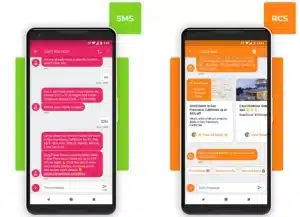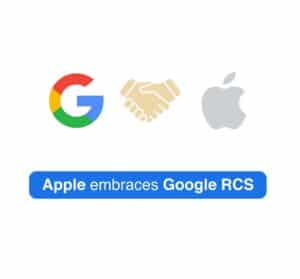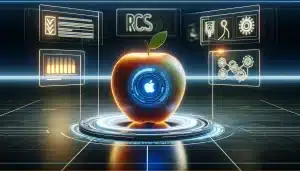Excitement and frustration danced in the air in November of 2023, as Apple dropped a bombshell – the promise of supporting Rich Communication Services (RCS) standard messaging on iPhones come 2024. In a significant stride towards enhancing cross-platform texting, Apple has finally yielded to the demands of the tech arena. After years of resistance, Apple announced that it will support RCS messaging on iPhones. This decision comes after persistent attempts by Google, Samsung, and other competitors to persuade Apple to adopt the technology.
The surge of anticipation, coupled with the twinge of frustration from past limitations, forms the backdrop of this groundbreaking revelation. It’s not just an announcement; it’s a pivotal moment that resonates with every iPhone user who has ever longed for more from their text exchanges. This is not just another tech update; it’s a journey into a new way of expressing yourself through the art of texting.
Let’s acknowledge the frustration that has lingered for far too long. You’ve been there – attempting to share high-resolution videos or images, only to be thwarted by the limitations of the existing messaging services. The struggle to convey the essence of your visual stories, the compromise in the quality of your shared moments – it’s a familiar pain. Those green and blue bubbles, laden with unmet expectations, have fueled countless conversations about the need for change. Not to mention the broken group chat messages in the past.
Here’s the unspoken truth – your frustration is justified. For years, the disparity between Apple and Android messaging has been the elephant in the room. The limitations imposed by SMS, the struggle to share media seamlessly, the green bubble woes – it’s time to address them all. It’s not about Apple versus Android; it’s about a universal desire for a messaging experience that transcends the boundaries of devices.
As we embark on this journey together, a promise awaits you. Brace yourself for a narrative that goes beyond the conventional tech update chatter. We’re not just discussing features and functionalities; we’re delving into the emotional core of your texting journey. The promise? A glimpse into the future, a future where your texts are more than words on a screen – they’re an extension of your emotions, shared seamlessly through the marvel of RCS.
The Evolution of Texting: RCS Unveiled

Before we unravel the potential of RCS, let’s revisit the saga of the long-standing rivalry between Apple and Android in the messaging realm. The ongoing tussle, marked by green and blue bubbles, has been a source of both amusement and frustration. The inability to share high-resolution media, the struggle for compatibility – it’s a narrative that has defined your texting experience.
Enter Rich Communication Services (RCS), the beacon of hope in the evolution of texting. Last summer, Google fired a shot across Apple’s bow, urging the tech giant to embrace RCS and revolutionize the way iPhones communicate with Android devices. The argument is simple yet profound – RCS is the modern industry standard, a leap beyond the outdated SMS and MMS methods. It promises a text messaging experience that aligns with contemporary expectations.
What does RCS bring to the table? A symphony of features designed to elevate your texting encounters. Picture this – clear images and videos that do justice to your memories, read receipts that add a layer of assurance, and the ability to send texts over Wi-Fi networks. RCS is not just an upgrade; it’s a transformation of your messaging landscape.
Apple’s decision to integrate RCS into its messaging framework holds profound implications for both iPhone and Android users. The allure not only lies in the promise of standard messaging features we’ve come to expect from a messaging app. From typing indicators, real-time messaging, workable group chats, and rich media sharing – RCS transforms text messaging into a dynamic and interactive endeavor. All within the confines of traditional text messages.
The benefits of RCS messaging extend beyond the realm of plain text. The advent of RCS brings the iPhone messaging experience closer to popular instant messaging platforms, offering a spectrum of features that redefine conventional text exchanges.
The blame game has echoed through the corridors of tech debates. Google points the finger at Apple, asserting that the woes of messaging between iPhones and Androids exist because of Apple’s reluctance to adopt modern texting standards. The green bubble dilemma, the lack of clear media sharing, the absence of Wi-Fi texting, the once broken messages in group chats – all attributed to the resistance to embrace RCS.
However, this is not a battle of giants; it’s a plea for a universal language of texting. It’s about breaking free from the limitations that have defined your texting habits. The blame game may linger, but the promise of RCS offers a glimpse into a future where texting transcends the boundaries of devices.
The Silent Revolution: RCS and the Apple Stance

As the debate intensifies, you might find yourself caught in the crossfire of the blame game. Apple’s iMessage, while offering a unique experience for iPhone users, has inadvertently contributed to the messaging divide. The iconic blue bubble, the animations, and features exclusive to iMessage users – it’s a world apart from the universal green bubbles that signify cross-device messaging.
Apple’s refusal to adopt RCS has been a bone of contention. Google’s campaign, urging Apple to “fix green and blue bubbles,” emphasizes the need for a unified messaging experience. The reluctance to support RCS is seen as a strategy to retain iPhone users within Apple’s ecosystem. While Apple CEO Tim Cook remains nonchalant about the clamor for RCS, the battleground of messaging compatibility rages on.
The future remains veiled in uncertainty as Apple maintains its silence on RCS support for iMessage. The green and blue bubble saga, the disparities in features, and the lack of a universal texting standard continue to shape your messaging experiences. The question lingers – will Apple cave to the pressure for RCS support, or will external forces compel a shift in the texting landscape?
iMessage’s Stand: RCS Integration Without Compromise

Contrary to speculations, the integration of RCS does not signal the opening of iMessage to other platforms. According to reports, RCS will coexist with iMessage, replacing the outdated SMS and MMS services. Noteworthy is the fact that RCS messages on iPhones will appear green, akin to current SMS messages. This strategic move seems to be a response to regulatory pressures, particularly the European Union’s Digital Markets Act (DMA), pushing for greater interoperability among major tech services.
RCS will only replace SMS and MMS and will exist separately from iMessage. Also, RCS messages will be green, similar to the current SMS messages. This change is likely a response to the regulatory pressure from the European Union’s Digital Markets Act (DMA), which requires major companies like Apple to make their services interoperable with other platforms. In September, the European Commission opened an investigation into iMessage to determine whether it should be considered a “core platform service”.
However, Apple reportedly argued that iMessage isn’t popular enough in Europe for the rules to apply, and it’s planning to file an appeal against the government’s regulation of its App Store. Google and Samsung get what they asked for Companies like Google and Samsung have long pushed for Apple to add support for RCS with multiple marketing campaigns and videos. Google even sent a letter to the European Commission arguing that iMessage should be considered a core platform service under the DMA. While Apple may not be adopting RCS out of its own willingness, the addition of RCS is a welcome change. It will significantly improve the quality of videos sent between iPhones and Androids and address other missing features that make it less appealing to text between devices.
The regulatory landscape aside, the inclusion of RCS fulfills the wishes of companies like Google and Samsung, who advocated for Apple to adopt RCS through various marketing campaigns and appeals to regulatory bodies. Apple’s commitment to RCS Universal Profile, as outlined by the GSM Association, promises improved interoperability compared to SMS or MMS.
In response to the developments, an Apple spokesperson conveyed, “Later next year, we will be adding support for RCS Universal Profile, the standard as currently published by the GSM Association. We believe RCS Universal Profile will offer a better interoperability experience when compared to SMS or MMS. This will work alongside iMessage, which will continue to be the best and most secure messaging experience for Apple users.”
Choosing Your Messaging Destiny
In the midst of this texting turmoil, you have a choice – a choice that transcends the limitations of the green and blue bubbles. While the RCS revolution hangs in the balance, alternative messaging apps beckon. Meta’s Messenger, WhatsApp, and Instagram stand as viable options, providing a plethora of features for seamless communication. The world of messaging is vast, and your options extend beyond the confines of Apple’s iMessage.
Signal, Discord, and Telegram offer universality, bridging the gap between iOS and Android. These platforms, accessible on both app stores, promise compatibility and feature-rich experiences. As the debate over RCS unfolds, these alternatives present an immediate solution to the texting woes that have plagued iPhone users for far too long.
The messaging app you choose becomes a statement, a testament to your desire for a texting experience that transcends device boundaries. Will Apple eventually embrace RCS, or will these alternatives become the new norm? The future of texting compatibility remains uncertain, but your choice empowers you to navigate the present landscape with a messaging experience that aligns with your expectations.
Texting Redefined, Future Unwritten

As we navigate the contours of texting’s past, present, and potential future, one thing is clear – the excitement and frustration surrounding Apple’s RCS revelation are palpable. The emotional journey of texting, marked by limitations and desires, finds a focal point in the RCS revolution.
The revolution isn’t just about technology; it’s about emotions woven into every text, every shared moment, and every frustration overcome. Whether Apple embraces RCS or alternative messaging apps become the new norm, the future of texting remains unwritten. Your choice, your emotions, and your messaging habits play a pivotal role in shaping the narrative of texting in the digital age.
As you reflect on your favorite texting features, envision the possibilities RCS brings to the table. The era of green and blue bubbles may persist, but the potential for a universal language of texting beckons. Your texting destiny is in your hands – what features of RCS are you most eager to explore, and how will this transformative technology change your overall phone experience? The answers lie in the unfolding chapters of the texting revolution – a revolution where emotions, technology, and choice converge to redefine the way we communicate, one text at a time.
Communication for the Future

While no exact timeframe has been provided, the move holds the potential to revolutionize text messaging between iPhones and other devices. RCS, with its advanced features, is capable of supporting typing indicators, high-quality media sharing, and in-line reactions – elements that were, until now, exclusive to texts between Android phones using the Google Messages app.
Currently, RCS handles these features for texts between Android phones that are using the Google Messages app, which is the default texting app on most Android phones.
In the words of a Google spokesperson, “Everyone deserves to communicate with each other in ways that are modern and secure, no matter what phone they have.” Google welcomes Apple’s participation in advancing RCS through collaboration with the GSMA and anticipates a positive impact on iOS that aligns with equitable and secure messaging for all.
“That’s why we have worked closely with the mobile industry to accelerate the adoption of RCS, and we’re happy to see Apple take their first step today by coming on board to embrace RCS. We welcome Apple’s participation in our ongoing work with GSMA to evolve RCS and make messaging more equitable and secure, and look forward to working with them to implement this on iOS in a way that works well for everyone.”
Should this indeed take place, it doesn’t necessarily mean that all of Apple’s best iMessage features would suddenly be available to Android users. Both Apple and Google have included their own exclusive features in their texting apps, such as Apple’s Check In feature for location sharing and Google’s Magic Compose feature that uses artificial intelligence to draft texts. It also might not mean the death of the green bubble versus blue bubble situation.
As this development unfolds, it’s crucial to note that the inclusion of RCS doesn’t necessarily imply the universal availability of all iMessage features on Android devices. Both Apple and Google retain their exclusive features, and the age-old green bubble versus blue bubble distinction may persist. The texting landscape is evolving, and with Apple embracing RCS, a new era of cross-platform messaging experiences is on the horizon.

